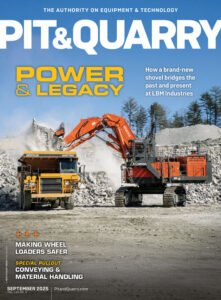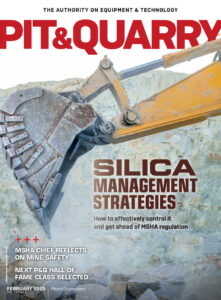■ Shift work may disrupt sleep. Workers on a shift schedule often do not get enough sleep. The Centers for Disease Control & Prevention recommends adults get at least seven hours of sleep. Research, however, indicates that shift workers – especially those working night shifts – usually only get four to six hours of sleep.
Shift work schedules can disrupt mine worker circadian rhythms and potentially cause circadian rhythm disorders. Circadian rhythms are physical processes that drive bodily functions such as wakefulness and sleepiness, body temperature and hunger. These rhythms signal wakefulness during the day and sleepiness at night through exposure to environmental cues such as the light-dark cycle, which is driven in part by the amount and wavelength of light entering the eye.
As an example, workers on a day-shift schedule who work 6 a.m. to 4 p.m. are exposed to light throughout the day when their bodies are naturally awake, which aligns with the body’s circadian rhythm. Alternatively, workers on a night-shift schedule working from 9 p.m. to 7 a.m. are exposed to light throughout the night when their bodies are naturally sleepy, which is counter to the body’s circadian rhythm.
As a consequence, workers on the night-shift schedule are working against their circadian biology, which can lead to circadian desynchrony.
Circadian desynchrony, or disruption, develops over time when there is a conflict between circadian rhythms and sleep/wake patterns. Because night-shift workers are not exposed to enough light at night and they’re exposed to too much light during the day while they are trying to sleep, their circadian rhythms can become desynchronized.
While night-shift schedules are a prevalent practice in many industries, research indicates that even among seasoned, permanent night-shift workers, only a small minority ever fully adjusts to night shift work.
Prolonged periods of circadian desynchrony can lead to serious health consequences, including obesity, diabetes, immune dysfunction, cancer and circadian rhythm sleep disorders, such as shift work disorder or jet lag disorder.
These health outcomes can further interfere with total sleep time, resulting in a cognitive performance decline, which can increase the likelihood of fatal and nonfatal occupational injuries. While occupational injuries can have serious negative consequences for employees, they can also be costly and burdensome for employers and operators.
■ Shift work may reduce workforce morale and productivity. Nonstandard shift schedules can decrease the amount of time mine workers have for social interactions and family activities. This can reportedly result in poor work-life balance and lead to low workforce morale, poor productivity and increased absenteeism.
Fatigue and associated health-related productivity loss, experienced most often by workers on nonstandard shifts, are estimated to cost U.S. employers $136.4 billion each year. These losses are nearly four times the cost of non-fatigued workers, which represent $35.4 billion in productivity losses annually.
Research shows a 43 percent increased risk of depression for night-shift workers, and shift workers in general are almost twice as likely to use illicit drugs compared to those working a standard day shift.
■ Shift work may negatively affect worker health. Workers on a nonstandard shift schedule likely sleep less and experience greater disruptions to their sleep schedules. And there are potentially serious health consequences to prolonged and persistent insufficient sleep, including Type 2 diabetes, cardiovascular disease, weight gain and obesity, hypertension, heart disease and stroke, depression, impaired immune function, increased pain and an overall increased risk of all-cause mortality.
In addition to the many negative health consequences, research indicates that insufficient sleep impacts cognitive performance, which impairs job performance, increases the number of errors made on the job and puts workers at greater overall risk.
■ Shift work may result in costly injuries, fatalities or damaged and lost equipment. Shift work and fatigue not only affect mine worker health but also their safety. Because it is difficult to directly infer fatigue-related causality in any given instance of occupational safety incidents, researchers often look to the timing and prevalence of such incidents to determine the likely impact of fatigue.
Using this method, studies found a significantly increased risk of fatigue for night-shift workers, with risk increasing over successive shifts along with higher risk for 12-hour shifts compared to eight-hour shifts.












